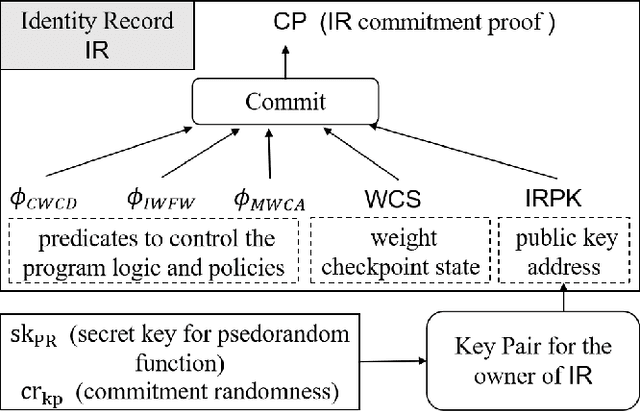Tianxiu Xie
A2-DIDM: Privacy-preserving Accumulator-enabled Auditing for Distributed Identity of DNN Model
May 07, 2024



Abstract:Recent booming development of Generative Artificial Intelligence (GenAI) has facilitated an emerging model commercialization for the purpose of reinforcement on model performance, such as licensing or trading Deep Neural Network (DNN) models. However, DNN model trading may trigger concerns of the unauthorized replications or misuses over the model, so that the benefit of the model ownership will be violated. Model identity auditing is a challenging issue in protecting intellectual property of DNN models and verifying the integrity and ownership of models for guaranteeing trusts in transactions is one of the critical obstacles. In this paper, we focus on the above issue and propose a novel Accumulator-enabled Auditing for Distributed Identity of DNN Model (A2-DIDM) that utilizes blockchain and zero-knowledge techniques to protect data and function privacy while ensuring the lightweight on-chain ownership verification. The proposed model presents a scheme of identity records via configuring model weight checkpoints with corresponding zero-knowledge proofs, which incorporates predicates to capture incremental state changes in model weight checkpoints. Our scheme ensures both computational integrity of DNN training process and programmability, so that the uniqueness of the weight checkpoint sequence in a DNN model is preserved, ensuring the correctness of the model identity auditing. In addition, A2-DIDM also addresses privacy protections in distributed identity via a proposed method of accumulators. We systematically analyze the security and robustness of our proposed model and further evaluate the effectiveness and usability of auditing DNN model identities.
Binary Linear Tree Commitment-based Ownership Protection for Distributed Machine Learning
Jan 11, 2024Abstract:Distributed machine learning enables parallel training of extensive datasets by delegating computing tasks across multiple workers. Despite the cost reduction benefits of distributed machine learning, the dissemination of final model weights often leads to potential conflicts over model ownership as workers struggle to substantiate their involvement in the training computation. To address the above ownership issues and prevent accidental failures and malicious attacks, verifying the computational integrity and effectiveness of workers becomes particularly crucial in distributed machine learning. In this paper, we proposed a novel binary linear tree commitment-based ownership protection model to ensure computational integrity with limited overhead and concise proof. Due to the frequent updates of parameters during training, our commitment scheme introduces a maintainable tree structure to reduce the costs of updating proofs. Distinguished from SNARK-based verifiable computation, our model achieves efficient proof aggregation by leveraging inner product arguments. Furthermore, proofs of model weights are watermarked by worker identity keys to prevent commitments from being forged or duplicated. The performance analysis and comparison with SNARK-based hash commitments validate the efficacy of our model in preserving computational integrity within distributed machine learning.
 Add to Chrome
Add to Chrome Add to Firefox
Add to Firefox Add to Edge
Add to Edge